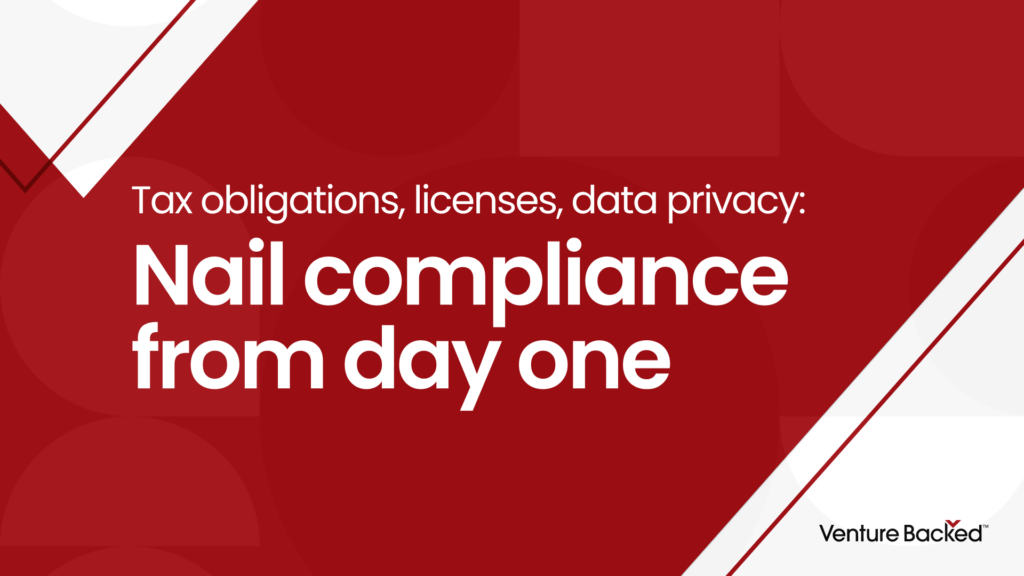According to the Thomson Reuters Risk & Compliance Survey Report, three out of five corporate risk and compliance professionals aren’t confident in their ability to manage compliance risks. If professionals feel this way, imagine the risks for a startup just getting off the ground.
Regulatory compliance is essential for safeguarding your business’s future; it provides a solid foundation that keeps you on track and legally secure.
Let’s explore the essentials that every startup founder needs to master: tax obligations, business licenses, and data privacy laws.
Understand Startup Taxation Basics
Albert Einstein was on to something when he said, “the hardest thing in the world to understand is the income tax”. For startups, it’s not just confusing, it’s a common source of stress.
Taxes can feel overwhelming, especially when you’re already managing the chaos of a new business. But taking the time to understand them is crucial for your success. Startups deal with different kinds of taxes—income tax, sales tax, self-employment tax—the list goes on. Each one matters, and timely, accurate filing is non-negotiable if you want to keep your business running smoothly.
Common Tax Mistakes to Avoid
- Misclassifying employees as contractors: Did you know that misclassifying an employee as a contractor is one of the most common tax errors startups make? This simple mistake can cost you thousands in penalties.
- Missing out on eligible deductions: Another frequent misstep? Missing out on deductions you’re entitled to. Travel, equipment, meals—these are all potential deductions that can significantly reduce your tax burden. Understanding what you can claim, and being thorough with records, can save you a lot of stress (and cash).
- Poor record-keeping: Poor record-keeping is a costly mistake. Without it, you risk missing out on savings. Keeping thorough and organized records of expenses, receipts, and other financial documentation not only ensures compliance but also helps uncover opportunities to save money and streamline your finances.
Tips for Staying Compliant
Don’t go it alone. Investing in the right accounting software can simplify your life. Surrounding yourself with finance and tax professionals you can trust makes all the difference. The steps you take today to get expert guidance will save you headaches (and potentially big costs) in the future. Trust us, it’s worth it.
Securing Essential Business Licenses
Running a business without the right licenses is a risky game. The penalties for operating without proper licensing can be severe, and they can bring your business to a halt.
Having the right licenses is about more than just following rules; it’s about establishing your credibility. Customers are far more likely to trust and choose a business that operates transparently and responsibly. This trust becomes a foundation for your startup’s growth and reputation, showing customers that you’re committed to doing things the right way.
Identifying Required Licenses for Your Startup
Different types of businesses require different types of licenses. Here’s a simple way to break down what’s needed:
- Federal Licenses: Some industries, like broadcasting, aviation, and agriculture, require federal licensing. Check if your startup falls under federal regulations.
- State Licenses: Depending on the state you operate in, there may be specific requirements for your industry. Common examples include professional licenses for services like legal advice, construction, or healthcare.
- Local Licenses and Permits: Don’t forget about city or county permits. This can include health permits for food businesses, zoning permits, or fire safety permits.
- Industry-Specific Requirements: Different industries have unique requirements. For example, a food startup will need health permits, while a tech startup might need data handling and compliance certifications.
Understanding which licenses apply to you is a crucial first step. Once you know what’s required, it’s much easier to take action and stay compliant.
Steps to Obtain and Maintain Licenses
Obtaining the right licenses is just the beginning—keeping them up to date is equally important. Here are some practical steps to help you manage the process effectively and stay compliant long-term:
- Research and Identify: Start by researching what licenses you need at federal, state, and local levels. Make a list, and check it twice.
- Application Process: Follow the specific steps to apply for each license. This might include filling out forms, paying fees, or providing necessary documentation.
- Keep Track of Renewals: Many licenses must be renewed periodically, sometimes annually. Set up reminders well in advance of renewal deadlines to avoid last-minute stress or late fees.
- Maintain Proper Records: Keep all your licenses and permits well-organized. Go above and beyond: create both physical and digital copies so you can access them easily when needed.
- Regular Reviews: Your licensing needs may change as your business grows or expands into new areas. Make it a regular practice to review your licenses and make sure everything is still up to date.
Startup Guide to Data Privacy Laws
Data is one of your business’s most valuable assets, and it needs to be handled with care. According to a recent Pew Research survey, 62% of people said it’s impossible to go through daily life without companies collecting their data. This constant data collection is a major source of stress for many, 79% are worried about how companies use their data.
These numbers show just how important it is to protect customer data. Mishandling data can lead to serious consequences—not just legal ones, but also losing the trust of your customers. People expect their information to be treated responsibly and securely.
High-profile breaches in the news are clear reminders of how quickly trust can be destroyed. For startups, protecting data is crucial for earning and maintaining customer confidence. It goes beyond just compliance—it’s about building trust.
Key Regulations Affecting Startups
Startups need to navigate various data privacy laws, such as GDPR in Europe and CCPA in California, depending on where they operate and where their customers are based. These regulations are designed to protect user data, and failing to comply can lead to severe penalties.
Beyond financial repercussions, non-compliance can seriously harm your startup’s reputation. Customers expect their personal information to be handled responsibly, and understanding these regulations helps you meet that expectation. Make it a priority to understand which regulations apply to your startup so you can stay compliant and protect your customers.
Best Practices for Data Protection
To stay compliant with data privacy regulations, it’s important to start with foundational practices:
- Encrypt Sensitive Data: Make sure all sensitive customer information is encrypted to protect it from unauthorized access.
- Access Control: Limit access to data within your team. Only those who absolutely need access should have it.
- Clear Privacy Policies: Develop privacy policies that are easy for users to understand, ensuring they know how their data is being used.
- Team Education: Educate your entire team on data privacy best practices, because everyone plays a role in keeping customer data secure.
These steps ensure your startup handles customer data responsibly, fostering trust and keeping you confidently compliant.
Building a Proactive Compliance Strategy
Being proactive about compliance offers numerous benefits. Staying within legal boundaries is important, but building trust with customers and investors is equally crucial. Startups that respect regulations demonstrate their commitment to long-term growth, enhancing credibility with customers and investors.
Creating a Compliance Checklist
Make compliance a habit. Regular audits, employee training, and awareness sessions go a long way. Create a checklist that covers all your bases—taxes, licenses, data privacy.
This checklist should be a living document, updated regularly as your business grows and regulations evolve.
Leveraging Tools and Resources
Consider using compliance management software to keep track of all your obligations. And don’t hesitate to get help from professional advisors—legal, tax, and financial experts can be invaluable in keeping your startup on the right track.
Recap the Stakes
The risks of ignoring compliance are real: hefty fines, lawsuits, and even the collapse of your business. But the peace of mind that comes with proactive compliance is priceless. Staying ahead of regulatory requirements isn’t just smart—it’s essential for any startup that wants to grow and succeed.
Simplify compliance for your startup. Explore more on our blog.





